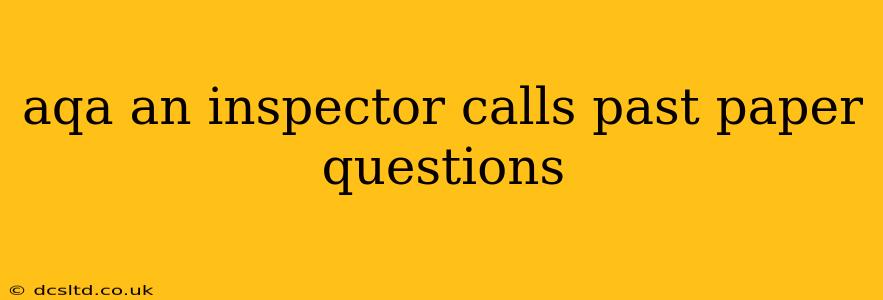J.B. Priestley's An Inspector Calls remains a staple of GCSE English Literature, consistently appearing on AQA exam papers. Understanding the recurring themes and common question types is crucial for success. This guide will delve into frequently asked questions, offering strategies for tackling them and highlighting key areas to focus on in your revision.
Common Themes and Question Types
AQA examiners often focus on these key themes in An Inspector Calls:
- Social Responsibility: Questions will explore Priestley's socialist message and how characters' actions reflect their social class and responsibilities towards others. Expect questions analyzing the Inspector's role in exposing societal failings and prompting self-reflection.
- Responsibility and Guilt: The play hinges on individual and collective responsibility. Questions may delve into the guilt each character feels (or doesn't feel), exploring how this guilt (or lack thereof) shapes their actions and Priestley's social commentary.
- Power and Class: The play starkly contrasts the wealthy Birlings with Eva Smith, highlighting the inequalities of the time. Expect questions on how Priestley uses dramatic techniques to expose the abuse of power and the devastating consequences of class divisions.
- Dramatic Techniques: AQA questions often analyze Priestley's masterful use of dramatic techniques, such as dramatic irony, foreshadowing, and the Inspector's interrogative style. Understanding how these techniques contribute to the play's themes and impact is vital.
- The Inspector's Role: The Inspector is a complex and enigmatic character. Questions will explore his purpose, his methods, and whether he's a real person or a figment of the Birlings' imaginations. Analyzing his impact on the characters and the audience is key.
Frequently Asked AQA An Inspector Calls Questions & How to Approach Them
Here are examples of typical AQA questions, along with strategies for effective answers:
1. How does Priestley present the theme of social responsibility in An Inspector Calls?
This is a broad thematic question. To answer effectively:
- Identify key characters: Focus on how Arthur Birling, Sybil Birling, and Eric Birling demonstrate (or fail to demonstrate) social responsibility. Contrast their attitudes and actions.
- Analyze key scenes: Discuss specific scenes where social responsibility is highlighted or challenged. For example, the interrogation scenes reveal the characters' selfish attitudes and lack of concern for others.
- Use textual evidence: Support your arguments with direct quotes and references to specific actions and dialogue. Explain how the quotes support your analysis.
- Consider Priestley's intentions: Explain how Priestley uses the play to criticize the social injustices of his time and promote a message of collective responsibility.
2. "The Inspector is the most important character in the play." To what extent do you agree?
This question focuses on character analysis and its impact on the play's overall meaning.
- Analyze the Inspector's role: Discuss how the Inspector acts as a catalyst for change, prompting the Birlings and Sheila to confront their actions. Consider his methods (interrogation, revelation of facts).
- Compare him to other characters: Compare the Inspector's influence with that of other characters, such as Sheila, who undergoes a significant transformation. Consider if any other character could be argued as more important.
- Discuss ambiguity: Consider the possibility that the Inspector might be a symbolic figure or a product of the Birlings' collective guilt. Exploring this ambiguity enriches your response.
- Consider the play's ending: Analyze how the play's conclusion adds to or detracts from the Inspector's overall importance. Does the final phone call undermine his authority?
3. Explore Priestley's use of dramatic irony in An Inspector Calls.
This question focuses on a specific dramatic technique.
- Define dramatic irony: Begin by clearly defining dramatic irony.
- Identify examples: Provide specific examples of dramatic irony from the play. For instance, the Birlings' ignorance of the consequences of their actions.
- Analyze its effect: Discuss how the dramatic irony creates tension, suspense, and reveals the characters' hypocrisy and blindness.
- Explain Priestley's purpose: Explain how Priestley uses dramatic irony to expose social injustices and challenge the audience's assumptions.
4. How does Priestley present the theme of guilt in An Inspector Calls?
This explores another central theme. Remember to:
- Focus on individual responses to guilt: Analyze how different characters react to the revelation of their involvement in Eva Smith's death. Some show remorse, while others try to evade responsibility.
- Explore the different types of guilt: Consider feelings of personal guilt, social guilt, and collective guilt. How do these contribute to the overall message?
- Use textual evidence to support your analysis: Quotes from key dialogues will strengthen your arguments.
- Consider the play's ending: Does the final phone call impact the sense of guilt felt by the characters? Does it alter Priestley's message?
By thoroughly understanding these common themes and practicing with past paper questions, you can confidently tackle any AQA An Inspector Calls exam question. Remember to always support your arguments with textual evidence and analyze how Priestley's techniques contribute to the play's overall impact and message. Good luck!
